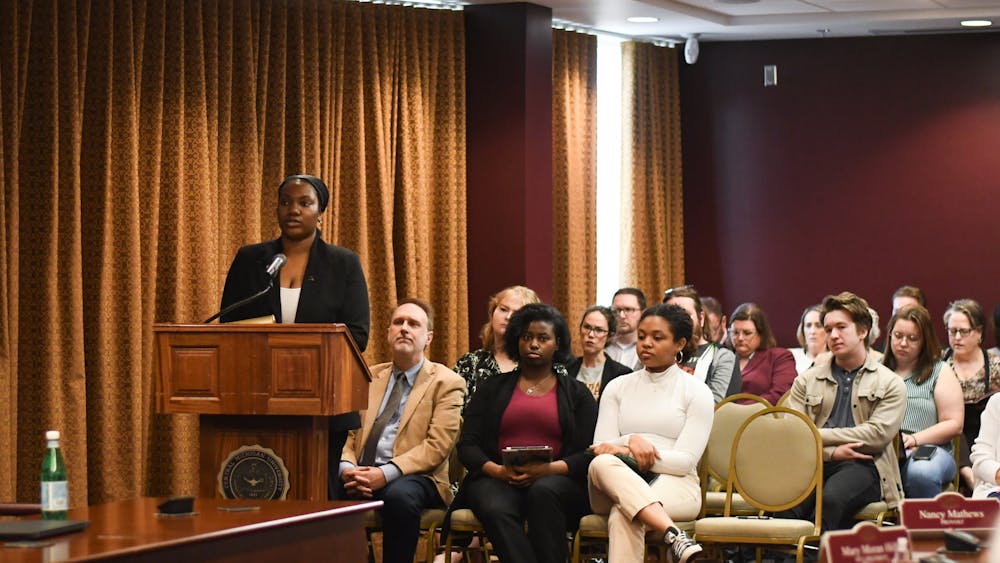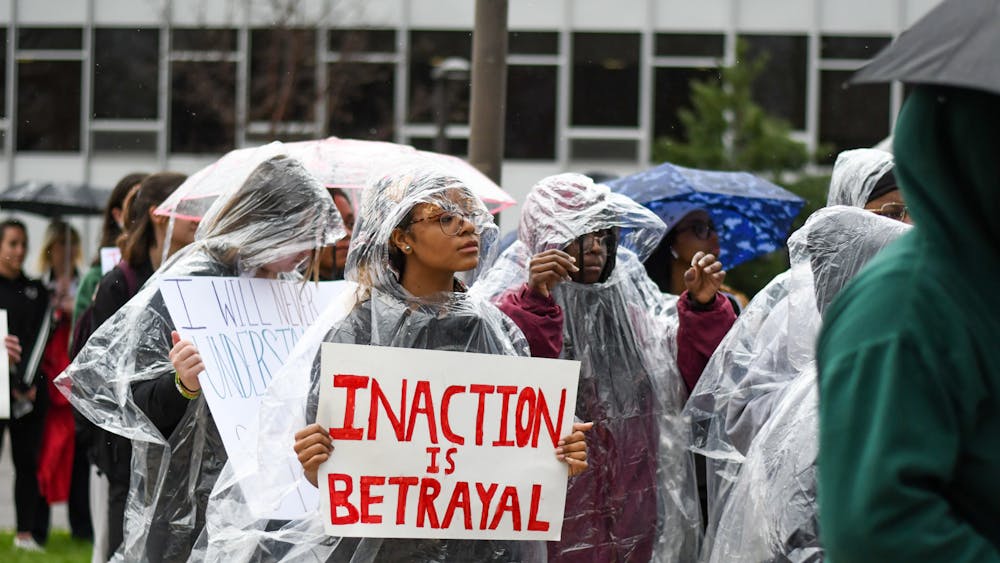CMU, law enforcement struggle to understand new phenomenon of ‘event’ binge drinking
Alcohol abuse is not a new problem, but party culture at Central Michigan University is evolving in a way police and administrators are finding difficult to understand. Excessive consumption is the new norm. Event drinking and binging have replaced the house party.
In October, event drinking proved fatal for an 18-year-old man who wasn’t enrolled here.
According to CMU’s research, young students view binge drinking and partying as essential to the university experience – ideas formed before they are enrolled at the university.
Out of the 2,539 freshmen who took Part I and II of Residence Life’s mandatory AlcoholEdu program in fall 2014, 54 percent said they consume shots and engage in party pre-gaming when drinking alcohol. That number is nearly 7 percent higher than the national average.
The survey also asked students about negative consequences they experienced related to drinking. What is alarming for school administrators is that 41 percent reported blacking out. That number is also higher than the national average by 4 percent, and has been on the rise since 2012.
These new challenges are making it difficult for police and Residence Life officials to fight an issue they don’t completely understand.
“It’s disappointing because we continue to see this pattern of behavior,” said Michelle Veith, associate director of Residence Life. “(Event drinking) is not isolated to CMU. No one knows how to completely combat it. We just throw stuff at a wall and see what sticks.”
The Rise of 'Event Drinking'
Student Affairs Executive Director Shaun Holtgreive uses a term to classify a growing campus phenomenon – "event drinking." It is a college life cliche, Holtgreive said, that is perpetuated by messages from peers and the media that tell young people there are no rules or consequences for excessive, or irresponsible, partying.
"Somehow (party holidays) have taken on this mystique," Holtgreive said. "While I don't condone what happens at some Welcome Weekends, (I understand) it's tied to something. You know it was coming."
This year Welcome Weekend parties drew big crowds, including many out-of-town revelers, but Holtgreive said these gatherings don't compare to the growing emphasis on holidays like the all-day drinking that happens on St. Patrick’s Day.
"About eight or 10 years ago, St. Patrick's Day was just another day," he said. "No one back then said 'Let's get dressed up and go drinking at 8 a.m.’ When it first started to build that kind of reputation it was a surprise to everyone."
On March 17, St. Patrick’s Day, Central Michigan Life reported that EMS transported at least 10 students off campus to McLaren Central Michigan hospital for alcohol poisoning. Veith confirmed six of those alcohol-poising transports departed from Residence Halls.
Dr. Daniel Wilkerson, director of emergency medicine at McLaren Central, said the number of student-related alcohol poisonings was actually higher. Wilkerson said he could not give a total number of alcohol poisoning patients due to HIPAA restrictions.
"Most of the people we did see that day were highly intoxicated," Wilkerson said.
Drink-until-you-drop events are a big concern for emergency room staff.
"It seems every time we have a major event we get quite a lot of students that come in intoxicated," Wilkerson said. "Usually they’re not awake or have vomited on themselves. The main concern is protecting the airway to make sure (students) don’t (choke on their own vomit)."
During “event drinking” gatherings—tailgating, Welcome Weekend parties, Finals Week parties and St. Patrick's Day—safety is CMUPD's No. 1 priority, said Capt. Fred Harris. Most CMU police officers will not engage students unless they are causing disturbances, are visibly intoxicated or doing harm to themselves or others.
"We just don't stop students randomly. That's not our goal," he said. "Most people are there to have a good time. It's our obligation to just keep people safe."
Minors in Possession
It was an event celebration—homecoming—that drew Michael Hartnett and his friends to CMU in October. A two-day drinking binge resulted in him becoming dangerously intoxicated and wandering away from his friends in the early hours of Oct. 5. He was found by police drowned in the pond near Fabiano Botanical Garden and Charles V.Park Library.
Adults furnishing alcohol to minors while tailgating is something Harris said CMUPD always enforces. Following the investigation into Hartnett’s death, which showed he received alcohol from tailgaters on Oct. 4, partiers can expect even more scrutiny from police this fall. Any adult found furnishing alcohol to a minor on campus, or at a tailgate, could be charged with a misdemeanor, Harris said. Penalties include 60-90 days in jail, a maximum fine of $1,000 and mandatory community service.
"Any time you have a tragedy, it triggers us to reevaluate the situation," said Mount Pleasant Police Public Information Officer Jeff Browne.
Because of the trend toward event drinking, and how local police agencies tally citations, determining the number of minors charged with alcohol-related crimes is difficult. According to minor-in-possession citation data over the last 10 years, violations vary greatly. Central Michigan Life requested data from CMUPD and MPPD through Michigan’s Freedom of Information Act, a law that allows citizens access to public records.
Mount Pleasant police lump MIP and open intox violations into the same category, making it harder to discern the actual number of minors cited for alcohol use in a given year. The combination is used on the Michigan Incident Crime Reporting database, which also combines the violations into one category. MICR logs all of the available police data by year and can be found online at Michigan.gov.
Last year, CMUPD wrote 148 MIP citations. Ten years ago, the department issued 267 citations. In comparison, MPPD wrote 297 MIP/Open Intox citations last year, as opposed to 177 in 2005. The highest spike for MIP data for CMU police was in 2007 with 300 citations issued. Recently, Mount Pleasant's biggest year for MIP/Open Intox citations was in 2012 with 461 citations.
When asked about spikes in data on certain years, both Harris and Browne attributed the jumps to social events that bring CMU students together, exposing underage students to peers who are 21 years old.
Still, some parents, adults and other students feel that drinking with underage buddies or children is a victimless crime.
The same AlcholEdu data detailing negative consequences of drinking shows that 11 percent of incoming freshmen reported someone taking advantage of them sexually. Five percent said they took advantage of someone sexually while drunk.
There are also legal and financial consequences of underage drinking. If a student is cited for minor in possession of alcohol, it is classified as a misdemeanor, according to the Isabella County Trial Court's schedule of misdemeanor convictions and consequences.
Some students can get a sentence deferred, preventing the crime from showing up on a permanent criminal record.
If students cannot get their sentences deferred, they can face long periods of probation with drug and alcohol screenings, along with mandatory rehabilitation and community service at the defendant's expense. The state also reserves the right to suspend a driver's license and can issue fines ranging from $100-$500, not including court costs and fees.
Students caught drinking alcohol in a vehicle face even harsher penalties, like 90 days in jail on top of the other sanctions.
The university has its own set of sanctions. Those violations can be found in the Code of Student Rights, Responsibilities and Disciplinary Procedures Section 3.2.12 and 3.2.13 regarding controlled substances. The violations can be found under Section 4.
“Students get caught up in heavy-handed enforcement,” Browne said. “The feedback I usually get from students is, ‘Why are (police) so hard on us (for drinking)?’ We’ll educate and explain, but at some point, that isn’t enough. The next level has to be enforcement.”
Preventing Tragedy with Education
Nancy Parsons, a licensed professional counselor and addiction specialist in Mount Pleasant, describes the psychology behind college partying as being essential to a student’s need for freedom, independence and a sense of maturity.
"(Students) come to college with a rosy bubble around them, thinking that it’s all going to be fun and games. Studying and education are second," she said. "The fun and games are a powerful lure."
When Parsons counsels students for court-ordered treatment or at a parent’s urging to seek therapy, most often, alcohol abuse stems from assumptions and stereotypes about what students think college life is supposed to be like.
Other messages include an obligation for experimentation with drugs and alcohol since students are able to be their own person, coupled with a need to feel included, Parsons said.
Both Browne and Holtgreive also blame sweet, flavored-alcohol for making hard liquor more palatable to minors. Since it tastes more like soda or candy, it encourages drinkers to increase their rate of consumption. For students with little experience drinking 80-100 proof alcohol, and a low tolerance, excessive drinking often leads to blackouts or losing consciousness.
When a student drinks too much and nears dangerous blood alcohol levels, significant health concerns can arise, particularly alcohol poisoning. Wilkerson said the alcohol itself may not be life threatening, but it does decrease the instinct to breath. Alcohol poisoning may also impair the gag reflexes, leaving the airway open and increasing the possibility of choking on vomit.
In addition to being the police department’s public information officer, Browne also acts as the MPPD liaison officer for the university's alcohol education program. His involvement helps Browne establish a rapport with the student population in a way they wouldn't otherwise have with police officers, he said.
"This last Welcome Weekend was one of the reasons why I do the training that I do," Browne said. "Two different groups came to me. (They) knew me, felt comfortable (reporting over-intoxicated students) and we made sure those people went home."
CMU has five existing and two planned alcohol education programs for students, Veith said, which excludes two programs set aside for parents, Resident Assistants and Multi-Cultural Advisers. Out of the nine programs held at the university, Browne is involved with at least seven of them. Lt. Cameron Wassman of CMUPD also is involved in the programming.
The most well-known programs to incoming freshmen students are the online-based AlcoholEdu session, which is mandatory for freshman, and the “College Life and The Law” seminar. The latter is presented 12 times during Campus and Community Life Orientation sessions, Veith said.
College Life and the Law covers topics such as the student code, how to protect your property, city ordinances and bystander intervention. However, Browne said the most important and effective part of the program deals with alcohol abuse.
Police will give students who are over-intoxicated and anyone who helps get them medical attention amnesty from being charged with a possession citation. This is done, Browne said, to encourage students to save lives instead of fearing criminal charges for being involved or speaking up. Amnesty is also covered in the prevention program.
Browne believes College Life and the Law is making a difference. Hartnett's friends lost sight of him on the night he died, yet other bystanders saw him in a dangerously impaired state throughout the evening and said nothing. Browne said alcohol education programs and students taking better care of each other will prevent future tragedies.
"Police work is hard to measure. How do I prove that it works?" he said. "Maybe they still drink underage, but maybe they don't drink as much. Those moments give me the validation that what we're doing is working."
Both enforcement agencies and Residence Life continue to encourage students to take care of each other and to report any incident. To report an incident, call 911 or CMUPD dispatch at 989-774-3081. Anyone who thinks they or a friend has a problem with addiction should contact a local or university therapist, or a local 12-step organization such as Alcoholics or Narcotics Anonymous. A full list of meetings can be found online at http://www.cmia32.org.





